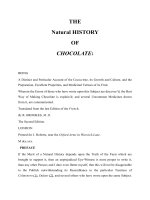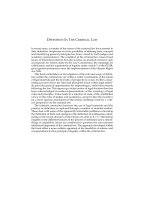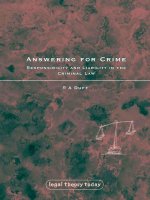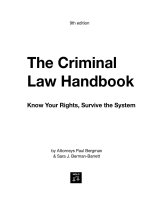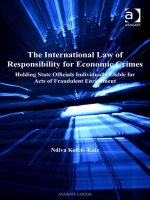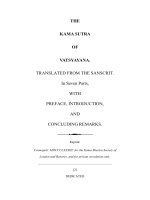THE CRIMINAL LAW OF GENOCIDE docx
Bạn đang xem bản rút gọn của tài liệu. Xem và tải ngay bản đầy đủ của tài liệu tại đây (987.37 KB, 300 trang )
THE CRIMINAL LAW OF GENOCIDE
INTERNATIONAL AND COMPARATIVE
CRIMINAL JUSTICE
Series Editors:
Mark Findlay, Institute of Criminology, University of Sydney
Ralph Henham, Nottingham Law School, Nottingham Trent University
This series explores the new and rapidly developing field of international and
comparative criminal justice and engages with its most important emerging themes
and debates. It focuses on three interrelated aspects of scholarship which go to the
root of understanding the nature and significance of international criminal justice
in the broader context of globalization and global governance. These include: the
theoretical and methodological problems posed by the development of international
and comparative criminal justice; comparative contextual analysis; the reciprocal
relationship between comparative and international criminal justice and contributions
which endeavor to build understandings of global justice on foundations of
comparative contextual analysis.
Other titles in the series:
Restorative Justice: Ideals and Realities
Margarita Zernova
ISBN 978 0 7546 7032 2
The Crime of Destruction and the Law of Genocide
Their Impact on Collective Memory
Caroline Fournet
ISBN 978 0 7546 7001 8
The Genocide Convention: An International Law Analysis
John Quigley
ISBN 978 0 7546 4730 0
A World View of Criminal Justice
Richard Vogler
ISBN 978 0 7546 2467 7
Punishment and Process in International Criminal Trials
Ralph Henham
ISBN 978 0 7546 2437 0
The Criminal Law of Genocide
International, Comparative and Contextual Aspects
Edited by
RALPH HENHAM
Nottingham Law School, UK
and
PAUL BEHRENS
University of Leicester, UK
© Ralph Henham and Paul Behrens 2007
All rights reserved. No part of this publication may be reproduced, stored in a retrieval system
or transmitted in any form or by any means, electronic, mechanical, photocopying, recording
or otherwise without the prior permission of the publisher.
Ralph Henham and Paul Behrens have asserted their right under the Copyright, Designs and
Patents Act, 1988, to be identified as the editors of this work.
Published by
Ashgate Publishing Limited Ashgate Publishing Company
Gower House Suite 420
Croft Road 101 Cherry Street
Aldershot Burlington, VT 05401-4405
Hampshire GU11 3HR USA
England
Ashgate website:
British Library Cataloguing in Publication Data
The criminal law of genocide : inernational, comparative
and contextual aspects. - (International and comparative
criminal justice)
1. Genocide 2. Trials (Genocide) 3. International offenses
I. Henham, Ralph J., 1949- II. Behrens, Paul
345'.0251
Library of Congress Cataloging-in-Publication Data
The criminal law of genocide : international, comparative, and contextual aspects / edited by
Ralph Henham and Paul Behrens.
p. cm. (International and comparative criminal justice)
Includes index.
ISBN 978-0-7546-4898-7
1. Genocide. 2. International criminal courts. I. Henham, Ralph J.,
1949- II. Behrens, Paul.
K5302.C75 2007
345'.0251 dc22
2006039320
ISBN 13: 978 0 7546 4949 7
Printed and bound in Great Britain by MPG Books Ltd, Bodmin, Cornwall.
Contents
Notes on Contributors ix
Preface xv
PART I HISTORICAL PERSPECTIVES
1 The Armenian Genocide: A Contextual View of the Crime and
Politics of Denial 3
Raffi Sarkissian
2 Armenian Genocide Claims: A Contextual Version of the 1915 Incidents 17
Sadi Cayci
3 Genocide and Nuremberg 29
Henry T. King Jr.
PART II CASE STUDIES
4 Has Genocide Been Committed in Darfur? The State Plan or Policy
Element in the Crime of Genocide 39
William A. Schabas
5 Sudan, the United States, and the International Criminal Court:
A Tense Triumvirate in Transitional Justice for Darfur 49
Zachary D. Kaufman
6 The Major Powers and the Genocide in Rwanda 61
Roméo Dallaire and Kishan Manocha
PART III ASPECTS OF THE CRIME
7 The Schism between the Legal and the Social Concept of Genocide
in Light of the Responsibility to Protect 75
Larissa van den Herik
The Criminal Law of Genocide
vi
8 Is the Emerging Jurisprudence on Complicity in Genocide before the
International Ad Hoc Tribunals a Moving Target in Conflict with the
Principle of Legality? 97
Michael G. Karnavas
9 Telling Stories and Hearing Truths: Providing an Effective Remedy to
Genocidal Sexual Violence against Women 113
Fiona de Londras
10 A Moment of Kindness? Consistency and Genocidal Intent 125
Paul Behrens
11 Freedom of Speech v Hate Speech: The Jurisdiction of ‘Direct and
Public Incitement to Commit Genocide’ 141
Tonja Salomon
PART IV INTERNATIONAL AND DOMESTIC PROSECUTION
OF GENOCIDE
12 The Prohibition of Genocide under the Legal Instruments of the
International Criminal Court 155
Tuiloma Neroni Slade
13 ICC Investigations and a Hierarchy of Referrals: Has Genocide in
Darfur been Predetermined? 165
Chris Gallavin
14 Specificity of Indictments in ICTR Genocide Trials 175
Paul Ng’arua
15 Cambodia’s Extraordinary Chamber: Is it the Most Effective and
Appropriate Means of Addressing the Crimes of the Khmer Rouge? 185
Alex Bates
16 The Prosecution of Genocide − In Search of a European Perspective 197
Jan Wouters and Sten Verhoeven
17 Reflection on the Separation of Powers: The Law of Genocide and
the Symptomatic French Paradox 211
Caroline Fournet
PART V PREVENTION, ALTERNATIVE JUSTICE SOLUTIONS
AND SENTENCING
18 The United Nations and the Prevention of Genocide 225
Juan E. Méndez
Contents
vii
19 Criminal Justice in the Aftermath of the 1994 Rwanda Genocide 231
Shivon Byamukama and John A. Kapranos Huntley
20 The Normative Context of Sentencing for Genocide 245
Ralph Henham
21 Genocide, Reconciliation and Sentencing in the Jurisprudence
of the ICTY 259
Shahram Dana
Index 275
This page intentionally left blank
Notes on Contributors
Alex Bates is a criminal barrister with 10 years experience of major criminal
prosecution and defence cases. In 2002, he was appointed Junior Counsel to the
Crown, Attorney General’s Panel of Prosecution Advocates. In May 2003, he
became the youngest ever International Prosecutor at the United Nations Interim
Administration Mission in Kosovo (UNMIK). In 2005, he completed an LLM
in International Human Rights and Humanitarian Law at Lancaster University,
researching the challenges of prosecuting genocide. Mr Bates is currently Senior
Assistant Co-Prosecutor to the United Nations Assistance Mission to the Khmer
Rouge Tribunal, based in Phnom Penh, Cambodia.
Paul Behrens is a Lecturer at the University of Leicester. He studied law and history
in Germany and England and has worked in the past, inter alia, for the European
Communities Committee of the House of Lords, London. In 2001, he was awarded an
LLM. for a thesis on diplomatic law by the University of Birmingham. Mr Behrens
has published articles on international criminal law and international humanitarian
law and is currently completing a PhD thesis on diplomatic law.
Shivon Byamukama completed her LLB at Makerere University, Uganda and her
Bar Course at the Law Development Centre, Kampala, Uganda in 2003. She then
worked with the Ministry of Commerce and the National Bureau of Standards in
Rwanda where her main duties concerned legislative drafting. In 2004, she won a
research scholarship from Glasgow Caledonian University to pursue PhD research
on ‘The legal aspects of Gacaca tribunal jurisdiction and the Reconciliation process
in Rwanda’. Ms Byamukama is a member of the Ugandan Bar.
Sadi Cayci, Associate Professor, Colonel, Military Judge (Retired), is currently
International Law Advisor at the Centre for Eurasian Strategic Studies (ASAM),
Ankara, Turkey. He retired from the Turkish Armed Forces, when he was the legal
adviser to the Chief of the Turkish General staff. His special areas of interest are
national security, law of the armed conflict, countering terrorism, and international
criminal law. As a Lecturer, he continues his activities both in Turkey and abroad,
which will include being a Course Director for the International Military courses on
the Law of Armed Conflict, held at the International Institute of Humanitarian Law,
Sanremo, Italy.
Roméo Dallaire, Lieutenant-General, can look back on a career of 35 years in
the military. During this time, he occupied a variety of commands at national and
international levels, and became one of Canada’s most respected soldiers. In 1994,
he led the UN mission in Rwanda. His book, Shake Hands With the Devil, an account
of his experiences during the 1994 genocide, has received the prestigious Governor
The Criminal Law of Genocide
x
General’s Literary Award for Non-Fiction for 2004. He was summoned to the Senate
of Canada on 24 March 2005.
Shahram Dana is an Assistant Professor of Law at Maastricht University
(Netherlands) and was previously a legal officer at the UN International Criminal
Tribunal for the Former Yugoslavia (ICTY). He teaches human rights, international
criminal law, international humanitarian law, European and comparative criminal
law, and international dispute settlement. His research interests include international
prosecutions in the context of international politics and power, ethics and justice
in international decision-making, and normative foundations of international
legal order. Currently, he focuses on the philosophy, legality, and methodology
of international punishment by international criminal courts with a view towards
developing an integrative theory that reinforces the values of humankind and the
aims of international prosecutions. He has written and lectured extensively on these
topics.
Fiona de Londras is a graduate of University College Cork, Ireland (BCL (hons),
LLM (hons)). She is currently reading for a PhD in the capacity of international
human rights law to be a controlling force in domestic counter-terrorism legislation,
and is an NUI travelling PhD Student (2005−2008) and President’s Research Scholar
(2005−2008). She is a part-time Lecturer in Griffith College Dublin and has held
visiting positions in University of Peshawar (Pakistan) and the Feminism and Legal
Theory Project (Emory University).
Caroline Fournet obtained a Master of International Law with distinction from the
Raoul Wallenberg Institute of Human Rights and Humanitarian Law in Lund, Sweden
for a thesis entitled ‘Nuremberg and its Aftermath: Accountability for Crimes Against
Humanity – Case Study: France’. In 2003, she obtained her PhD at the University
of Leicester on a thesis entitled: ‘Crimes Against Humanity: The Accumulated Evil
of the Whole’. After an internship at the Association for the Prevention of Torture, a
non-governmental organization based in Geneva, she was appointed as a Lecturer at
Exeter University’s School of Law.
Chris Gallavin (LLB First hons cant, PhD Hull) is a Lecturer of Law at the School
of Law, University of Canterbury, New Zealand where he is also Director of the LLM
in International Law and Politics. Dr Gallavin is a former Lecturer of the University
of Hull. He currently teaches criminal law and evidence at Canterbury. His PhD
focused on Prosecutor Discretion in the International Criminal Court.
Ralph Henham is the leader of the British Academy project on the Criminal Law
of Genocide. He is also one of the founders of the International and Comparative
Criminal Trial Project, in whose framework the research initiative ‘The Criminal
Law of Genocide’ was conducted. He has worked for the Nottingham Law School
since 1979. In 1998, he was appointed Professor of Criminal Justice at Nottingham
Trent University. Professor Henham was recently awarded a visiting Fellowship at
Notes on Contributors
xi
the Centre for Criminology, University of Oxford to pursue research on sentencing
in international criminal trials.
John A. Kapranos Huntley is a Professor of Law at Glasgow Caledonian
University, Scotland.
Michael G. Karnavas is a Criminal Defence Lawyer with over 20 years of
experience. He has worked as State and Federal Public defender in Alaska, USA.
Before the ICTY, Karnavas was Lead Counsel during the trial phase for Vidoje
Blagojević. He is currently Lead Counsel for Dr. Jadranko Prlić at the ICTY, while
also serving as President of the Association of Defence Counsel-ICTY.
Zachary D. Kaufman (BA Yale, M. Phil. Oxford) is a Juris Doctorate (JD) candidate
at Yale Law School while he is also completing his DPhil (PhD) in International
Relations at the University of Oxford, where he is a Marshall Scholar. Mr Kaufman
has worked on transitional justice issues while serving at the US Departments of
State and Justice, the UN International Criminal Tribunals for Rwanda and the
former Yugoslavia, and the International Criminal Court. Mr Kaufman founded and
leads two non-profit organizations that are helping to build Rwanda’s first public
library. He is also a Board Member and Senior Fellow of Humanity in Action.
During 2005−2006, Mr Kaufman was a Fellow at Stanford University’s Center on
Democracy, Development, and the Rule of Law.
Henry T. King, Jr., was a Prosecutor at the Nuremberg Trials, and a Chairman of
the Section on International Law and Practice of the American Bar Association. He
served as a member of the ABA Task Force on War Crimes in the Former Yugoslavia.
He has published over 70 articles on international legal subjects and a book on one
of the Nuremberg defendants, entitled The Two Worlds of Albert Speer. On 4 June
2002, Professor King was awarded an honorary degree of Doctor of Civil Laws by
The University of Western Ontario. In 2003, he was made an honorary member for
life of the Canadian Bar Association. Henry King is Professor of Law at the Case
Western University.
Kishan Manocha studied medicine and subsequently trained in psychiatry, working
for a year as a Research Fellow in Forensic Psychiatry at the University of London;
he is also Member of the Royal College of Psychiatrists of the UK. In 1999, he
switched to law and obtained a BA and an LLM (specializing in international law
and with First Class Honours) from Cambridge University. In 2003, he worked for
a spell at the Special Court for Sierra Leone, and between January and March 2005,
he was General Roméo Dallaire’s Research Assistant at the Carr Centre for Human
Rights at Harvard. Kishan Manocha was called to the Bar in 2004 and commenced
pupillage at 25 Bedford Row, a leading criminal chambers in London, in October
2006.
Juan E. Méndez is the first United Nations Special Adviser on the Prevention
of Genocide. As a result of his involvement in representing political prisoners in
The Criminal Law of Genocide
xii
Argentina, he was arrested by the military dictatorship of that country and adopted
by Amnesty International as a ‘Prisoner of Conscience’. He was General Counsel of
Human Rights Watch from 1994 and President of the Inter-American Commission
on Human Rights from 2002. Mr Méndez is currently president of the International
Center for Transitional Justice. Juan Méndez is the recipient of several human rights
awards, a member of the bar of Mar del Plata and Buenos Aires, Argentina, and the
District of Columbia, US.
Paul Ng’arua is a Senior Trial Attorney at the International Criminal Tribunal for
Rwanda. Mr Ng’arua was called to the bar in Kenya in 1990. From 1998 to 2002,
he was Director of Prosecutions of the Kingdom of Swaziland. Ng’arua is currently
in charge of the prosecution of the Interim Government of Rwanda in a case which
received the name ‘Government II’. In 2004, he received the Special Achievement
award for Prosecutors by the International Association of Prosecutors.
Tonja Salomon was called to the Berlin Bar in 2006. She is currently working as
a criminal defence lawyer in Berlin. She studied law in Potsdam and Barcelona. In
2005, she worked for the Appeals Section of the Prosecution at the International
Criminal Tribunal for Rwanda.
Raffi Sarkissian is Chairman of the Campaign for Recognition of the Armenian
Genocide, a UK-based single-issue pressure group established in 1994 (www.crag.
org.uk), involved in public speaking and author of several articles on Current Affairs
and the Armenian Genocide. Mr Sarkissian served as Chairman of the Armenian
Community and Church Council in the UK (1997–2002) and was a founding
member of The Forum of Armenian Associations of Europe (Geneva, 1999). Raffi
Sarkissian obtained BSc in Electrical & Electronic Engineering and MSc in Digital
Systems and Instrumentation in the UK. He is the head of Manufacturing Operations
at Learning Technology PLC (Viglen Limited).
William A. Schabas is Professor of Human Rights Law at the National University
of Ireland, Galway, where he is also Director of the Irish Centre for Human Rights.
He is the author of one of the principal texts (Genocide in International Law: The
Crime of Crimes) on the subject of genocide, and his writings have been frequently
cited by the Trial and Appeals Chambers of the International Criminal Tribunal for
the Former Yugoslavia. He served as one of the international members on the Sierra
Leone Truth and Reconciliation Commission.
Tuiloma Neroni Slade was the Presiding Judge of Pre-Trial Chamber II of the
International Criminal Court from 2003 to 2006. He was formerly Attorney-General
of Samoa. From 1993 until 2003, he was Ambassador to the USA and Samoa’s
Permanent Representative at the United Nations in New York. Judge Slade was
closely involved with the processes for the development of the International Criminal
Court, as head of the Samoan delegations to the negotiations, a Vice-President of the
Rome Conference in 1998 and Coordinator for the Preamble and Final Clauses of
the draft Statute of the Court.
Notes on Contributors
xiii
Larissa van den Herik is Lecturer in international law at Leiden University. Her
PhD Thesis, for which she received the Bulthuis van Oosternielandprize, is titled The
Contribution of the International Criminal Tribunal for Rwanda to the Development
of International Law (Martinus-Nijhoff). She is the editor-in-chief of the Leiden
Journal of International Law. Until 2005, Dr van den Herik was a Researcher and
Lecturer at the Free University, Amsterdam.
Sten Verhoeven obtained a Candidate in Law degree from the Katholieke Universiteit
Brussels with distinction in 1999. He continued his legal studies at the Katholieke
Universiteit Leuven, where he received his law degree with distinction in 2002.
During 2002−2003, he studied International Relations and Conflict Prevention at
the same university. He participated twice in the Jessup International Law Moot
Competition for the Katholieke Universiteit Leuven. From October 2003, he has been
Assistant at the Institute for International Law at the KU Leuven. Sten Verhoeven is
currently working on a PhD thesis on the sources of international law.
Jan Wouters was Legal Adviser to the Belgian Minister of Finance in 1989 and Law
Clerk at the Court of Justice of the European Communities from 1991 to 1994. From
1997 to 2003, he was Professor of European Banking and Securities Law at Maastricht
University. From October 1998, he has been Professor of International Law and the
Law of International Organisations, Director of the Institute for International Law
and Chairman of the International Relations Council at the Katholieke Universiteit
Leuven.
This page intentionally left blank
Preface
When knowledge of the atrocities of the National Socialist regime spread, there was
a feeling among contemporary observers that they were faced with a phenomenon
that was poorly addressed by the existing rules of international law. In those days,
Winston Churchill felt that the world was in the presence of a ‘crime without
a name’. And in those days, Raphael Lemkin, a Polish lawyer who had lost 49
members of his family in the Holocaust, gave a name to the crime. It was in his
seminal book Axis Rule in Occupied Europe (1943/1944) that the term ‘genocide’
made its first appearance; the root of a concept on which this current collection of
scholarly writings is based.
Lemkin was convinced that the appearance of this crime predated the Holocaust.
Today, it is necessary to acknowledge that the crime did not disappear when the
gates of Auschwitz were opened. The criminal tribunals which deal with genocide
today investigate its occurrence in the Cambodia of Pol Pot, in the Rwanda of
1994, in the territory of the Former Yugoslavia, in East Timor and in Iraq under
Saddam Hussein. The question of genocide in Darfur has given rise to a variety
of conflicting assessments. The legal evaluation of the crimes and the ways which
are open to the international community to prevent and to counteract it, are topics
which remain, unfortunately, of burning relevance.
In 2004, the Nottingham Law School started a research initiative, which
endeavoured to investigate the crime of genocide. The project, entitled ‘The
Criminal Law of Genocide – International, Comparative and Contextual Aspects’
intended to analyse the phenomenon of genocide not only from the perspective of
international criminal law. Its aim was the adoption of a contextual view, which
would embrace an examination of the historical, political and social conditions and
influences on the crime and the repercussions of its commission in these fields.
In the framework of this initiative, an International Conference on Genocide
was convened in September 2005 which brought together some of the foremost
authorities on international criminal law, including judges and practictioners from
all three international criminal tribunals. Over the course of two days, a variety of
aspects of the crime were debated, and scholarly papers on selected problems were
presented. Most of the chapters in this book are based on these contributions, which
have been carefully revised and edited to present a topical work which fulfils high
standards of academic quality.
The Criminal Law of Genocide is presented in five sections. The first part deals
with the evolution of the crime and its codifiction and includes two very different
perspectives of the Armenian events in 1915 as well as a chapter by a former
Prosecutor at the Nuremberg Trials, who had met Raphael Lemkin in the course of
his work. In the second part, a variety of case studies are presented – the particular
The Criminal Law of Genocide
xvi
focus here is on Darfur, but this section also includes a contribution on Rwanda, co-
written by the former Head of the UN Mission to that country. The third part deals with
particular elements of genocide, which allows a better understanding of the concept
of the crime. The fourth part, entitled ‘International and Domestic Prosecution of
Genocide’ contains a review of the ways in which various tribunals have approached
genocide, written by academics and practitioners in the field (including a former
Judge of the International Criminal Court). The fifth part deals with the prevention of
genocide, alternative justice resolutions and sentencing and includes a contribution
by the first UN Special Adviser on the Prevention of Genocide.
Our thanks go to all authors who have contributed to this unique collection
of writings on genocide. We would also like to thank the British Academy whose
funding has made the project on the Criminal Law of Genocide possible.
Ralph Henham
Paul Behrens
Nottingham, October 2007
PART I
HISTORICAL PERSPECTIVES
This page intentionally left blank
Chapter 1
The Armenian Genocide:
A Contextual View of the Crime and
Politics of Denial
‘Dedicated to the 90th Anniversary of
the Armenian Genocide’
Raffi Sarkissian
From Genocide to Holocaust
The Armenian Genocide of 1915 occurred less than 30 years before the Jewish
Holocaust. Adolf Hitler knew very well of how the world quickly forgot the
Armenians. Hitler drew comparisons between the Armenian Genocide and what he
was planning, using it as a means to encourage his followers. He said, ‘I have given
the command – and I shall shoot everyone who utters one word of criticism, for the
goal to be obtained in the war is not that of reaching certain lines but of physically
demolishing the opponent. Accordingly, I have put my death-head formations
in place with the command for them to send to death relentlessly and without
compassion, many men, women and children of Polish origin and language. Only
thus shall we gain the living space that we need. Who after all is today speaking of
the destruction of the Armenians?’ (Adolf Hitler, 1939).
1
Twenty-five years earlier on 29 September 1915, Turkish minister of the interior,
Talat Pasha conveyed to the Governor of Aleppo ‘… all of the Armenians living
in Turkey are to be destroyed and annihilated Without taking into consideration
the fact that they are women and children and disabled, their very existence will
be ended, regardless of how terrible the means of destruction may be, and without
being moved by feeling of compassion.’
Before World War I and after Turkish military officers of Union and Progress
(Ittihad ve Taraghy) took power in Turkey, they established an alliance with
Germany. They were widely referred to as ‘Young Turks’ who proved to be capable
of using violence in order to achieve their goals.
1 Modern History Sourcebook: Adolf Hitler, the Obersalzberg Speech. www.fordham.
edu/halsall/mud/hitler-obersalzberg.html/
The Criminal Law of Genocide
4
At the beginning of WWI the Young Turks devised a plan that on the surface
aimed to modernize Turkey whereas in reality the intention was to cleanse Turkey of
Armenians, Greeks, and other minorities. The nation was mobilized to exterminate
the Armenian population of Eastern Anatolia through systematic, premeditated and
coordinated efforts that began in 1914 and were accelerated over the following years.
Through secret orders Armenian men were rounded up and sent into forced labour
for the building of the Trans-Turkish railways. The government then ordered the
mass execution of Armenian political leaders and intellectuals of Constantinople in
April 1915. Women and children were also uprooted and driven into the desert under
the guise of resettlement and often without food or shelter.
In discussing the doom of ‘two million or more Armenians’ slated for wholesale
‘deportation’, Ambassador Morgenthau observed, ‘As a matter of fact, the Turks
never had the slightest idea of re-establishing the Armenians … When the Turkish
authorities gave the order for these deportations, they were merely giving the death
warrant to a whole race; they understood this well, and, in their conversation with
me, they made no particular attempt to conceal the fact’
2
. In other words, from the
very outset the genocidal intent was there; the respective decision was firm and
implacable. The German state archives, containing a vast amount of wartime
confidential and secret reports from German ambassadorial, consular, and military
officials stationed in Turkey during the war as that country’s allies, amply and
unmistakably attest to this fact.
3
The process of humiliation and dehumanization of Armenians throughout the
campaign was reported through several western foreign officials and missionaries.
They contributed towards the extensive evidence based upon which the Armenian
genocide was acknowledged at the time as ‘crime against humanity’ and more
recently recognized by several countries and parliaments.
4
The first attempt to establish an international criminal court was made on 24 May
1915, accompanied by the suggestion that massacres of ethnic minorities within a
State’s own borders might give rise to both State and individual responsibility. The
joint declaration by governments of Great Britain, France and Russia, asserting that
‘in the presence of these new crimes of Turkey against humanity and civilisation, the
allied Governments publicly inform the Sublime Porte that they will hold personally
responsible for the said crimes all members of the Ottoman Government as well as
those of its agents who are found to be involved in such massacres’.
After the fall of the Ittihadist government and as the First World War came to an
end, most of the senior Ittihad leaders found refuge in Germany. The new Turkish
Government arrested several of Ittihad party leaders who were suspected of direct
involvement in the deportations and annihilation of Armenians, preparing cases
2 Morgenthau, and Ambassador, ‘The Murder of A Nation’, Chapter XXIV; http://www.
lib.byu.edu/~rdh/wwi/comment/morgenthau/Morgen24.htm.
3 Dadrian, V.N. (1994), ‘Documentation of the Armenian Genocide in German and
Austrian Sources’, in
Widening Circle of Genocide: A Critical Bibliographic Review,3
Charny, I. (ed.) (New Brunswick, NJ: Translation), pp. 104−107.
4 Dadrian, V.N. (2004), ‘Patterns of Twentieth Century Genocides: The Armenian,
Jewish, and Rwandan cases’ 6(4) Journal of Genocide Research 487.
The Armenian Genocide
5
against them for criminal offences under Turkish law. A series of trials followed
during the 1918–1920 Armistice period resulting in an important catalogue of
confessions, secret party orders and papers providing evidence of the tactics and of
means employed by the Ittihadist leaders in their campaign for annihilation of the
Armenians.
During the trials, Yözgat Deputy Sakir personally testified to the fourth sitting of
the Yözgat trial series (11 February 1919) that the orders for ‘massacre’ were relayed
‘secretly’. Secret wire evidence was introduced at the ninth (22 February 1919) and
twelfth (6 March 1919) sittings of the same trial series to substantiate the charge of
the secret intent of massacre underlying the entire system of deportations. During
a debate in the Chamber of Deputies on the Armenian massacres, Trabzon Deputy
Hafiz Mehmet declared that he and other deputies had known for a long time that
the government had ordained the program of extermination of Armenians, relying
chiefly on the Special Organisation for its implementation (Teshkilate Mahsuse).
5
The aforesaid trials were strongly contested by the Turkish nationalist movement,
who opposed the prosecutions, symbolizing them as foreign efforts aimed at
dismembering Turkey. What followed under the leadership of Mustapha Kemal
resulted in delays and obstructions of Turkey’s criminal prosecutions, providing
opportunities for destruction of evidence, the escape of those on trial, as well as
wide spread demonstrations and public unrest. Furthermore, due to the rivalry of
Britain, France and USA for the potential that Turkey offered of opportunities in oil
and other valuable resources as well as Kemal’s ability to exploit this opportunity,
the international treaties that followed, particularly the conditions set forth by treaty
of Serves of 1920, did not result in justice for the Armenians. In the mid-1920,
a political officer at the British High Commission in Istanbul cautioned London
of practical difficulties involved in prosecuting Turks for the Armenian massacres,
including obtaining evidence. By late 1921, the British had negotiated a prison
exchange agreement with the Turks resulting in the release of and the genocide
suspects held in Malta.
6
This failure went on to have substantial effect on the course
of history and the developments towards World War II, Nazis and the Holocaust.
Attempts by Turkish jurists to press for trial before the national courts of those
responsible for the atrocities were slightly more successful. Prosecuted on the basis
of the domestic penal code, several ministers in the wartime cabinet and leaders of the
Ittihad party were found guilty by a court martial, on 5 July 1919, of ‘the organisation
and execution of crime of massacre’ against the Armenian minority. The guilty, main
architects of the genocide Talaat Pasha, Minister of the Interior and Enver Pasha,
Minister of War were sentenced, in absentia, to capital punishment. Further trials
were conducted before other Ottoman courts, partly on the basis of Article 171 of
the Ottoman military code concerning the offence of plunder of goods, and invoking
‘the sublime precept of Islam’ as well as ‘humanity and civilisation’ to condemn
‘the crimes of massacre, pillage and plunder’. These trials resulted in the conviction
5 Dadrian, V.N. (1991), Documentation of the Armenian Genocide in Turkish Sources,
(New York: State University of New York at Geneseo), pp. 96−100.
6 Schabas, W.A. (2000), Genocide in International Law, (Cambridge: Cambridge
University Press).
The Criminal Law of Genocide
6
and execution of three of the perpetrators, Mehmed Kemal (county executive of
Bogazhya), Abdullah Avni (of the Erzincan gendarmerie), and Behramzade Nusret
(Bayburt county executive and District Commissioner Ergani and Urfa (Edessa)).
7
The Armenian genocide could have easily been extended to include the Ottoman
Jews. The Jewish population of Yishu were well aware they were next in line for a
Turkish genocide. Indeed, during the spring of 1916, the order for their expulsion
from Jaffa was a distinct possibility. Due to the intervention of the US and German
consuls with the Turkish Government in Jerusalem the plan was halted thus avoiding
the same fate that befell the Armenians.
8
In drawing parallels and similarities between the Armenian genocide and the
Holocaust, the most significant reason appears to be that both Armenians and Jews
were despised minorities undergoing rapid social mobilization and adaptation to the
modern world, under the regimes of the Ottoman Empire and Imperial Germany
respectively. In addition both imperial regimes were swept away by revolution
and war, as well as being succeeded by revolutionary vanguards who became the
perpetrators of the two genocides; finally, both genocides occurred in the middle of
major wars.
9
The fact that the Armenian Genocide had been so readily forgotten contributed to
the failure of the European Jewish Community to notice the early activities leading
to Hitler’s final solution. More importantly, perhaps, the close alliance of Ottoman
Turkey and Germany at the time, as well as the propagation of ideologies based on the
belief of racial supremacy in the former and in its more extreme sense fascism in the
latter, are further reminders that at the time of war, or whenever the opportunity may
be considered favourable, the threat imposed by the ruling majority may culminate
in the extermination of national minorities.
Recognition of the Armenian Genocide and Politics of Denial
The ample existence of documentary evidence on the genocide of Armenians and
the research material published later in the twentieth century, as well as the effort
of international scholars, Armenian institutions and individuals, the responsibility
of recognizing the crime became the subject of discussion at various international
forums. Since April 1965, several parliaments, legislative bodies and assemblies
have recognized the Armenian Genocide. In the case of France (2001) denial of
the Armenian Genocide is considered a crime and therefore protected by law. On
18 January 2001 the French National Assembly − resisting intense pressure from
the Turkish Government − adopted a measure publicly recognizing the Armenian
Genocide. According to National Assembly Representative Francois Rochebloine,
7 de Zayas, A. (2004), The Genocide against the Armenians 1915–1923.
8 Auron, Y. (2000), The Banality of Indifference: Zionism and the Armenian Genocide,
(Place: Transaction Books).
9 Melson, R. (1988), ‘Revolutionary Genocide: On the Causes of the Armenian Genocide
of 1915 and The Holocaust’, Purdue University, Remembering for the Future, The impact of
the Holocaust on the Contemporary World, Theme II, papers presented at the International
Scholars’ Conference Oxford, 10–13 July.
The Armenian Genocide
7
recognition of the Armenian Genocide opens the door to ‘respect for human rights
and the establishment of trust’ between Turkey and its neighbours.
In the days leading up to the vote, Turkish Government officials applied heavy
pressure to the Administration of the French President Jacques Chirac and members
of the French Assembly, threatening those Franco-Turkish relations would suffer
if the Armenian Genocide resolution was approved. Following the adoption of
the measure, the Turkish Government condemned the vote, stating that a ‘serious
and lasting’ blow had been dealt to bilateral relations. The Turkish Ambassador to
France was immediately recalled for ‘consultations’. According to Agence France
Presse, the head of the Turkish trade chamber called for a boycott of French goods
in retaliation to the Armenian Genocide vote. However, the Turkish co-chairman
of the Turco-French Business Council denounced moves of immediate economic
retaliation. ‘We should not act hastily. It is easy to spoil relations, but rebuilding
them is difficult’, he noted.
In addition an assembly of over 20 international historians acknowledged
the truth of the Armenian Genocide in 2001. Polish, German and Lithuanian
Parliaments are the most recent in joining the ranks of progressive governments
who acknowledge historical truth without diverting their attention and becoming
entangled in politics of Denial. Furthermore, in June 2005, The International
Association of Genocide Scholars wrote to the Prime Minister of Turkey, R.T.
Erdogan, stating that … ‘We note that there may be differing interpretation of
genocide – how and why the Armenian Genocide happened, but to deny its factual
and moral reality as genocide is not to engage in scholarship but in propaganda and
efforts to absolve the perpetrator, blame the victim, and erase the ethical meaning
of this history’ … .
In the UK, the City of Edinburgh Council officially recognized the Armenian
Genocide on 17 November 2005, this followed a lengthy debate with presentations
made by deputations from Turkish organizations with arguments against the
motion and an Armenian deputation headed by Campaign for Recognition of
the Armenian Genocide (Edinburgh and London chapters), which consisted of
personal family testimonies, historical, legal and political arguments in favour of
the motion, presented by Dr Hagop Bessos, Dr Donald Bloxham and Dr Harry
Hagopian respectively.
Despite an intensive campaign and attempts by Turkish organizations and its
embassy in London to block the motion, after a few postponements the council
continued with its agenda resulting in a clear majority vote in favour of the motion.
The motion states:
This Council notes that a number of Parliaments around the world have recognized, as
genocide, events that began in Anatolia in 1915, including, most recently, an 82% vote
in favour of recognition in the European Parliament on 28 September 2005. Council
also notes that recognition was acknowledged when Edinburgh hosted the UK’s Annual
Holocaust Memorial Day in 2003.
Council recognizes that atrocities and tragedies occurred on all sides in the conflicts which
began in 1915, but supports the view that the Ottoman actions against the Armenian
community did constitute genocide.
The Criminal Law of Genocide
8
Council welcomes Turkey’s application for membership of the European Union
and supports dialogue and reconciliation between the Turkish and Armenian peoples.
Council does not support the view that genocide recognition should be made a
condition for membership of the European Union.
Given the recent successes and the progress made in Recognition of Armenian
Genocide, and during 2005, the 90th Anniversary, the Turkish Government
(following the steps of its predecessors) has intensified its efforts in denying the
reality of the genocide. Having exhausted its resources for denial, it is beginning to
take contradictory actions by undermining its integrity and credibility.
In May 2005, the first all-Turkish Conference on ‘The Armenian Issue’ due to
take place at Bogazici University from 25 to 27 May was ‘postponed’ after justice
minister Cemil Çiçek accused the organizers of treason. This unique conference
jointly organized by history departments of Bogazici and Sabanci as well as
Comparative Literature department of Bilgi universities under the title of ‘Ottoman
Armenians during the decline of the Empire: Issues of Scientific Responsibility
and Democracy’ had created a vast interest with 26 distinguished academics on the
organizing and consulting committees from Turkey, Germany, USA and France.
‘The emergence of different and critical opinions will be to Turkey’s benefit,
because it will show how rich in pluralist thinking Turkish society actually is.’ The
press release stated, ‘Today, 90 years after the tragic 1915 incidents, it’s time for
Turkey’s people of science and thought to jointly raise their voices differing from the
official thesis’ on the Armenian killings.
It was precisely this aspect of the conference that appeared to arouse the suspicion
of what Turks call the ‘deep state’ – the entrenched statist-nationalist establishment
comprising conservative members of Turkey’s state bureaucracy, judiciary and
military. Such an open manifestation of intellectual dissent prompted an immediate
and forceful response from leading representatives of ‘deep state’ thinking.
10
Çiçek condemned the initiative as a blow to government efforts to counter a
growing Armenian campaign to have the killings recognized internationally as
genocide, which many fear may cloud Turkey’s bid to join the European Union.
‘This is a stab in the back of the Turkish nation … this is irresponsibility’, Anatolia
quoted Çiçek as saying at a parliament debate.
Critical opinions do exist in Turkey. Some 110 academics and the respected
Turkish Economic and Social Studies Foundation have already voiced their
opposition to the official policy of genocide denial. But the government is trying to
silence this real opposition by creating myths of treason and of being stabbed in the
back. Further, two local NGOs – the Izmir Contemporary Attorneys’ Association
and Izmir Human Rights Association – filed charges with the Supreme Court of
Appeals against Justice Minister Çiçek, claiming he had violated several articles of
the Turkish Constitution. Çiçek’s remarks were truly outrageous but unfortunately
the pressure exerted resulted in postponement of the conference. The postponement
resulted in a wave of criticism within Turkey as well as the EU and the USA. Turkish
Government once again realized that restricting freedom of thought and expression
10 Torbakov, I. (2005), ‘Postponement of History Conference Sparks Controversy in
Turkey’. Eurasianet.org, 14 June.



